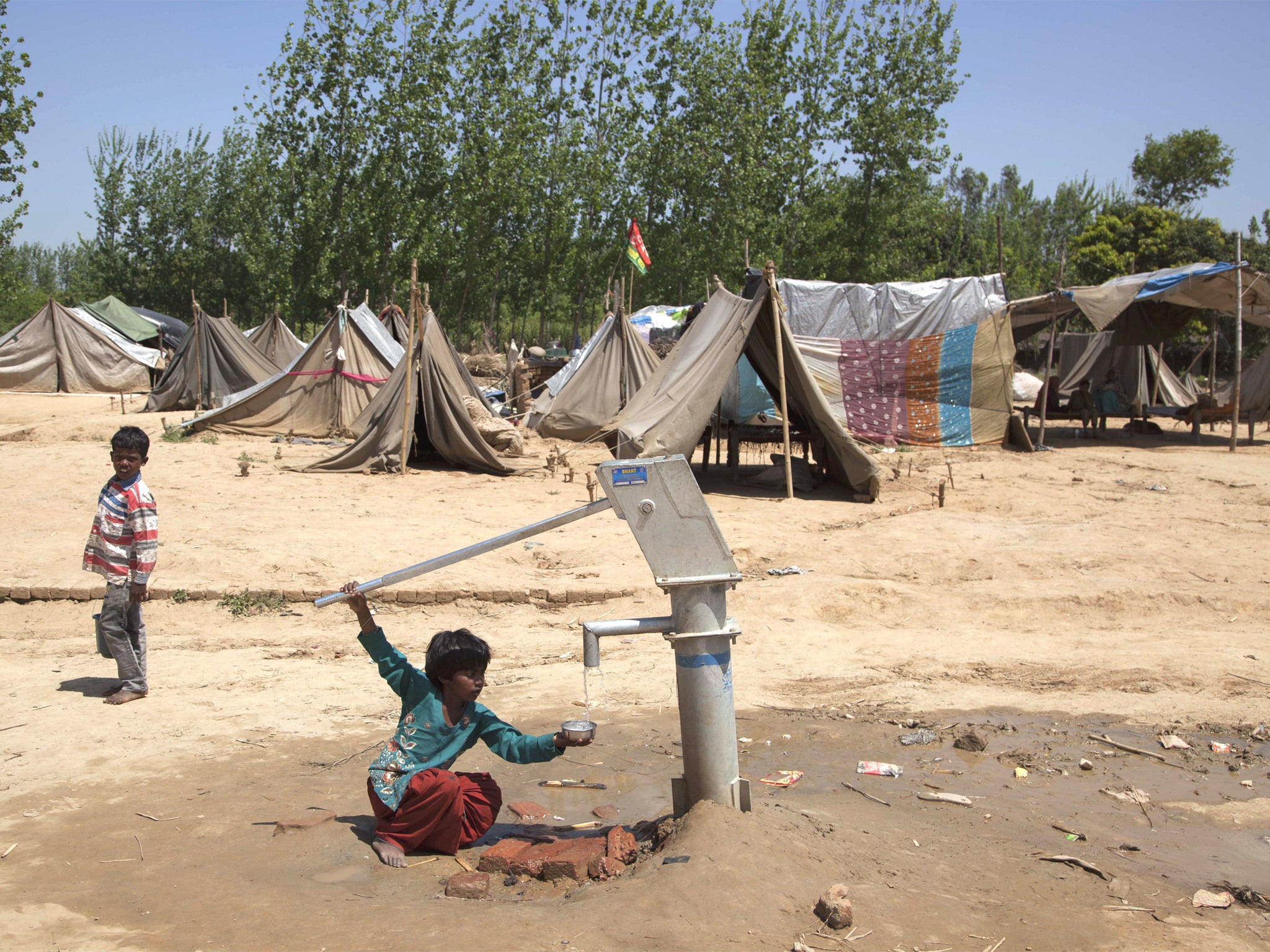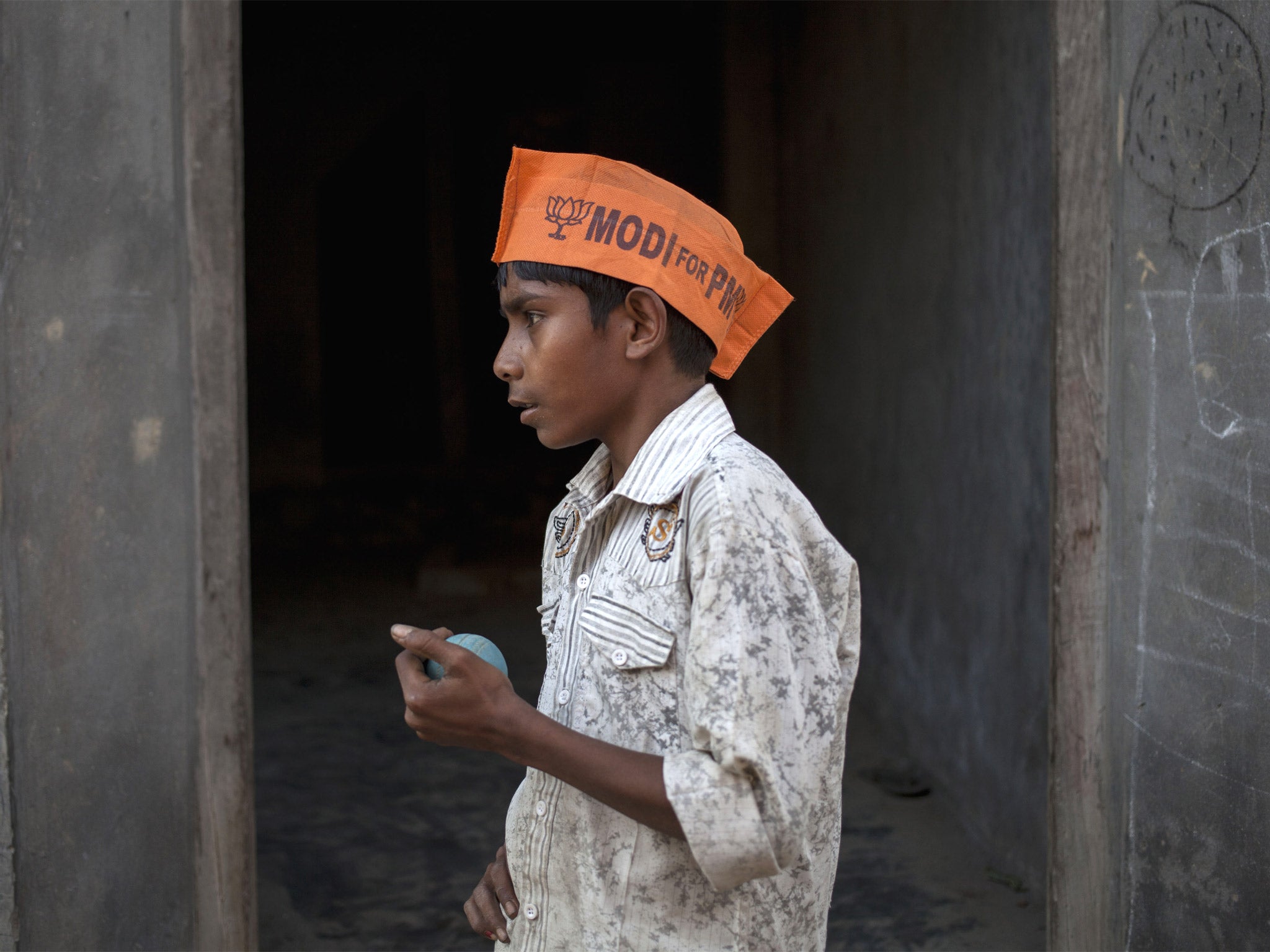India elections: Muslims fearful of returning home to villages as country returns to the polls
Andrew Buncombe in Kutba talks to the men and women who fled the violence last September at the hands of the Hindus in Uttar Pradesh

Your support helps us to tell the story
From reproductive rights to climate change to Big Tech, The Independent is on the ground when the story is developing. Whether it's investigating the financials of Elon Musk's pro-Trump PAC or producing our latest documentary, 'The A Word', which shines a light on the American women fighting for reproductive rights, we know how important it is to parse out the facts from the messaging.
At such a critical moment in US history, we need reporters on the ground. Your donation allows us to keep sending journalists to speak to both sides of the story.
The Independent is trusted by Americans across the entire political spectrum. And unlike many other quality news outlets, we choose not to lock Americans out of our reporting and analysis with paywalls. We believe quality journalism should be available to everyone, paid for by those who can afford it.
Your support makes all the difference.The side of the tent flapped noisily and when the wind really picked up everyone had to cover their eyes against the dust.
Since the beginning of the year, a 1,100-strong group of Muslims have been squeezed into this hot patch of land, too fearful to return to their homes, located just a couple of miles away.
“Eight of our people were killed there. Why do you think we will not go back?” said Mohammed Yukub, a shopkeeper. “It has been seven months and seven days since it happened and I have not been to the village once.”
India returns to the polls today in the third phase of a month-long process of electing a new government. Among the people voting in 92 constituencies across the country are those in a string of villages in the west of Uttar Pradesh which last year saw probably the worst communal violence in a decade.
In the second week of September, at least 69 people were killed and up to 100,000 forced from their homes, after clashes between Muslims and Hindus. The Muslim labourers and Hindu landowners, from the Jat caste, had lived alongside each other for centuries in a peaceful, if unequal, relationship. People were stunned by the blood-letting that erupted amid the normally quiet fields of sugar cane.
The precise details of the initial trigger for the violence remain disputed; many say a Muslim youth inappropriately approached a Hindu girl, whose two brothers then attacked and killed him in retribution. In turn, a Muslim mob killed the two Hindu brothers. Rapidly, what should have been a local incident had turned into a wave of revenge attacks spread over 90 villages. The majority of fatalities were Muslims.

Yet, in the aftermath of the clashes, rather than trying to ease the situation, it appears some politicians have tried to exploit the tension for their benefits. In particular, analysts say, the Bharatiya Janata Party (BJP), and its prime ministerial candidate, Narendra Modi, have made a special effort to appeal to the Hindu Jats.
Last week, Amit Shah, a senior aide to Mr Modi and a man accused of being involved in extra-judicial killings in the state of Gujarat, told Jat leaders that Thursday’s poll was about “getting revenge”.
Meanwhile, the Socialist Party, (SP) which controls the state government in UP, has sought to persuade Muslims that they are the only ones who will protect them. They have made this claim amid reports that senior SP officials intentionally allowed the situation to get out of hand in order to inflame the emotions of their vote bank.
“There has been tension between the communities,” said Ajoy Bose, an author and journalist who has written extensively about the politics of UP. “Amit Shah is fully aware of the communal situation in western UP.”
Some of the worst of last year’s violence played out in the twin villages of Kutba and Kutbi, located 15 miles from Muzaffarnagar, an area that is 30 per cent Muslim. Here, on the morning of 8 September, hundreds of Muslims fled from the town after their homes were attacked and ransacked. Eight people were killed.
When The Independent visited Kutba two weeks after the attack, the walls of many Muslim homes were blackened and yet Hindu villagers claimed people from outside were responsible. Some even said the Muslims had set fire to their own homes. At one of two mosques, some sort of accelerant had been thrown at a door and set alight, though it failed to take fully hold.
On the eve of polling, seven months later, little had changed. The Muslim homes, still unoccupied, were falling into disrepair, and weeds were growing in the courtyards of the mosques. The Hindu villagers were still adamant they were not responsible for what had happened.
Sitting on a chair in front of his home, Surender Baliyan, a landowner whose son Sanjeev, is the BJP’s candidate for the area, said the vast majority of those involved in the attacks were from outside of Kutba.
Hundreds of the party’s banners, bearing a lotus symbol, flew throughout the village and small children wore orange caps saying ‘Modi for PM.’ Mr Baliyan claimed that while the community had voted different parties over the years, this year they would be voting BJP. “When the state government tried to tame the Jats, it was the BJP who came to our rescue,” he said.
Mr Baliyan claimed the village felt saddened by what had happened and that the Muslims and Jats had once lived like family. He also said the Muslims had been invited back to their homes.
Yet in their hot, flapping tents on the square of land three miles from the village, the displaced Muslims of Kutba said they had no intention of returning. After last September’s attack they spent four months in emergency camps with Muslims from other villages, before buying the piece of land with compensation from the state government.
Several of them had lost family members in the violence. Mohammed Tasleem, 20, said his brother Irshad had been hacked to death. He was among several people buried in a makeshift cemetery. “He was a nice person. Every liked him,” said Mr Tasleem.
During the last election, Muslims from Kutba had voted for the Bahujan Samaj Party, a regional party whose leader, Mayawati, served several times as chief minister of UP, said Mr Yukub, the shopkeeper. This time they would be voting for the SP, though not in the polling station in Kutba. He dismissed suggestions that the SP was exploiting their suffering. “It is because of Mulayam Singh Yadav (the leader of the SP) that we have been able to buy this land. They gave us this money.”
There is much at stake on Thursday. The state of UP returns 80 members of parliament and analysts say Mr Modi must win 40 or 50 of them if he is to see the “wave” that could allow him to become prime minister. It was he who dispatched his aide to take control of the BJP campaign in UP and pay special attention to the ten seats in the west of the state that vote on Thursday.
Yet the violence that broke out last September again raised the spectre of communalism, something to which India is no stranger. There is no evidence that either Mr Modi or the BJP instigated the violence but many Muslims claim it was intentional.
They point to the massacre of hundreds of Muslims in Gujarat in 2002, which Mr Modi is accused of failing to prevent. “Modi himself said ‘What happened in Gujarat will happen in UP’,” claimed one young man.
The BJP’s candidate for Muzaffarnagar, Sanjeev Baliyan, is one of a handful of politicians facing claims of delivering inflammatory speeches during last year’s clashes.
Yet he claimed the party has been promoting peace and development. In an interview at the building in Muzaffarnagar he has been using as a campaign office, he said he would also try and ensure the Muslims displaced to Kutba.
As for his priorities if elected, he said: “Development, roads, electricity, the sugar cane industry. Everything.”
Join our commenting forum
Join thought-provoking conversations, follow other Independent readers and see their replies
Comments